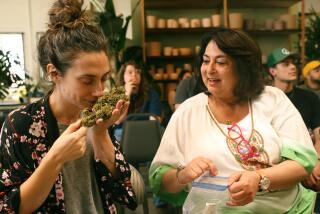How to Track Down Special Seeds
- Share via
Trying to find a special variety of vegetable or flower seed, perhaps any seed, can be hard this time of year.
If this happens to you, you might feel kinship with the American gardener of 200 years ago, when a limited quantity and variety of seeds were available. Few stores sold seeds in those days, so many Colonial gardeners would save their own seeds or exchange seeds with fellow Colonists and American Indians. Seeds also were imported from Europe, then sold by peddlers along with dry goods, foodstuffs and hardware.
The American seed trade expanded in the 1800s. First, bulk bins were replaced by plain paper seed packets, which eventually gave way to tempting, multicolored seed packets. Color seed catalogs followed, and, beginning in 1869 with B.K. Bliss and Sons, mail-order seeds.
This brings us to today, with untold numbers of seed varieties at our fingertips. Right? Maybe, maybe not.
Because relatively few seed companies dominate the business today, most seeds are sold nationwide, and varieties no longer have a local flavor. Varieties must appeal to gardeners in the rainy Pacific Northwest, the dry Southwest, the short-season Northeast and the sultry South.
Occasionally, though, you can find seeds of local favorites if you search out farm stores in rural areas. Fellow gardeners also can be a source for seeds, as in Colonial days.
Although today we are lucky to be able to choose from among 48 different packets of marigold seeds--the number offered in one large catalog--we might have trouble finding a packet of Ponderosa tomato or golden self-blanching celery seeds. These latter varieties are not hybrids.
Plant patent laws have made it profitable to create hybrids, so wherever possible, hybrid seeds dominate the market. Hybrid seeds have definite advantages to commercial growers but are not always the best choice for backyard gardens. Their uniform ripening, for example, is fine if you want to pick a thousand ears of corn for market this Thursday, but not if you want four ears for dinner every night for the next two weeks.
Fortunately, non-hybrids, which include heirloom seeds, are available from seed companies. There are also organizations whose members exchange seeds of a particular vegetable (for example, Corns, Route 1, Box 32, Turpin, OK 73950) or of all sorts of heirloom vegetables (Seed Savers Exchange, 3076 N. Winn Road, Decorah, IA 52101).
The seed trade closes shop for the season soon, and any seeds left in supermarkets and garden centers will be returned to seed companies. If you are planning to sow fall crops, stock up now.





